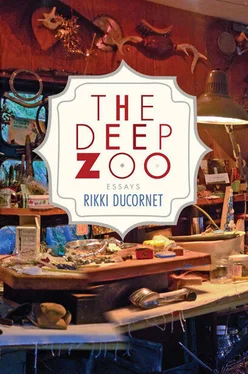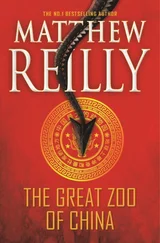Rikki Ducornet
The Deep Zoo
For my son, his spirited heart and music
Writing is the uncovering of that which was unrevealed.
— GHANI ALANI, Dreaming Paradise
In the tradition of Islam, the first word that was revealed to Mohammed was Igrá (Read!). The world is a translation of the divine, and its manifestation. To write a text is to propose a reading of the world and to reveal its potencies. Writing is reading and reading a way back to the initial impulse. Both are acts of revelation.

The Ottoman calligraphers delighted in creating mazes of embellishments in which the text was secreted like a treasure. The text needed to be deciphered and the task proved the worthiness of the reader. These calligraphers' mazes remind us that if the text is the mirror of an exorbitant, mutable universe, it is playful too. The maze places the text within an intimate space, very like a garden, where the text hides, then reveals itself; perhaps it could be said such a text is irresistible. Writes Gaston Bachelard: “All the spaces of intimacy are designated by an attraction” ( Poetics of Space ).

The texts we write are not visible until they are written. Like a creature coaxed from out a deep wood, the text reveals itself little by little. The maze evokes a multiplicity of approaches, the many tricks we employ to tempt the text hither. The maze is both closed and open; it demands to be approached with a “thoughtful lightness” (Calvino). The powers lurking within it are like stars. Despite their age and inaccessibility, their light continues to reach us and to reveal us to ourselves.

A playful mind is deeply responsive to the world and informed by powers instilled during infancy and childhood, powers that animate the imagination with primal energies. A playful mind is guided as much by attraction as consistency and coherence — and I am thinking here of Lewis Carroll’s Looking Glass world — its consistent tyrants, the coherence of its nonsense and the energy of Alice’s fearless lucidity. The Looking Glass reminds us that the world’s maze is attractive to eager thinkers. After all, playfulness describes as much the scientist as the artist (and Lewis Carroll was both).
The idea that the world was engendered by the spoken word comes to us from Egypt. Here language flourished, mirroring and delighting in the phenomenal world. Here Paradise persisted; the gods and their creatures dwelling together in good understanding or, phrased differently, in knowledge of one another. And if the world of nature and its book indicated the divine, it also provided a place of unlimited encounters. To name a thing was to acknowledge and evoke its primary potencies — religious, medical, and magical. Plants, minerals, and animals were not only animated by the divine breath (nous), they were its vessels. Each tree, bird, river, and star was an altar, the dwelling place of a god. To gaze upon the world’s image reflected in the waters of the Nile was to gaze into and reflect upon a sacred face or body: Hathor the cow-faced goddess embodied by the moon, Horus, the falcon, perched among the reeds.
Deep in the desert, each fossil shell was seen as Hathor’s gift, tossed to earth from the sky; the fossil sea urchin’s five-pointed star needled to its back indicated its stellar origins and explains why such things are found placed near the dead in ancient tombs. To use a lovely term of Gaston Bachelard’s, such a reverie — and to leap from stone to star can only be called a reverie—“digs life deeper, enlarge(s) the depth of life.” Bachelard offers these lines from the poet Vincent Huidobro:
In my childhood is born a childhood burning like alcohol.
I would sit down in the paths of night
I would listen to the discourse of the stars
And that of the tree.
— The Poetics of Reverie
Such sympathies —the stone, the moon caught in the branches of the willow, the gods, the stars — are born of looking at the world and a deep dreaming. The ancient world of sympathies, rooted in inquisitiveness and informed by imaginative seeing, gave us marvelous aesthetic and scientific achievements; alchemy for example — that exemplary amalgam of science and poetry, that “immense word reverie” says Bachelard. It would be a mistake to dismiss such sympathies as mere foolishness, for they were born of qualities of mind that illustrate what Italo Calvino calls the “lightness of thoughtfulness” ( Six Memos for the Next Millennium ) and illumine his phrase: “Poetry is the enemy of chance.” The moment one reaches for the star-struck stone, the reverie begins; the moment its star is recognized as a piece of the night sky fallen to earth, the poem begins. Chance gives way to a deep seeing and the recognition of a pattern that informs the mind with light, a pattern that incandesces and burns like alcohol. If poetry is the enemy of chance, it is also the daughter of chance.
If I have chosen to open this essay with an evocation of an ancient world and its sympathies, it is because the urgencies concealed within the maze of the mind that animate our imaginations, provoke incandescence on the page. I am not calling for magical thinking, obscurity, or preciousness, but for an eager access to memory, reverie, and the unconscious — its powers, beauties, terrors, and, perhaps above all, its rule-breaking intuitions, and to celebrate with you the mind’s longing to become lighter, free of the weight of received ideas and gravity-bound redundancies. If we were scientists and not writers, we would not waste our time reinventing gravity. Speaking of a poet he especially admires, Calvino says,
The miraculous thing about his poetry is that he simply takes the weight out of language to the point that it resembles moonlight.
— Six Memos for the Next Millennium
And Bachelard:
For things as for souls, the mystery is inside. A reverie of intimacy — of an intimacy which is always human — opens up for the (one) who enters into the mysteries of matter.
— The Poetics of Reverie
The mysteries of matter are the potencies that, in the shapes of dreams, landscapes, exemplary instants, and so on, inform our imagining minds; they are powers. For Bachelard they take the form of shells, a bird’s nest, an attic; for Borges a maze, mirrors, the tiger; for Calvino moonlight, the flame, and the crystal; for Cortázar ants on the march and the cry of the rooster.
Potencies are never static but in constant flux within our minds, and what’s more, they fall into sympathy with one another. For example, for Borges, there is an evident sympathy between the tiger’s stripes, the world’s maze, language, and the maze of the mind; for Calvino, between moonlight and the lucent transparency of clear thinking; for Bachelard, between attics and a love of solitude; for Cortázar, between the cock’s cry and the knowledge of mortality, of finitude.

The world of animals is an ocean of sympathies from which we drink only drops whereas we could drain torrents from it.
— LAMARTINE
(as quoted by Giovanni Mariottini in his essay on Aloys Zötl, FMR #1)
One evening years ago, a family circus set up its shabby tent in the park of a French village — Le Puy Notre Dame — I called home. As I approached the park, I heard the sound of a powerful motor and searched the sky for an airplane — a rarity at that time in that place. The sky was empty of everything, even clouds, and the thrumming I heard was the purring of tigers. An instant later, I saw the cage and two exquisite tigers, surely drugged; their contentment in such small quarters was uncanny. If I recall this distant evening, its circus and its tigers for you now, it is in the guise of an introduction to potencies in the shape of beasts.
Читать дальше













